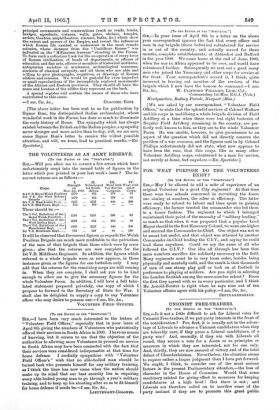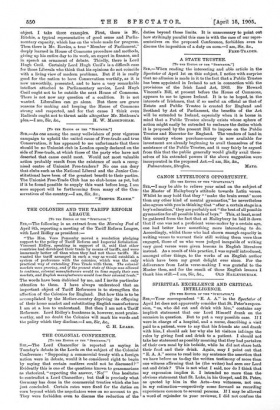UNIONIST FREE-TRADERS.
[TO THE EDITOR or TRIO "SPECTATOR."] SIR,—Is it not a little difficult to ask for Liberal votes for Unionist Free-traders, if we put party interests in the front of the consideration P For, first, it is usually not to the advan- tage of Liberals to advance a Unionist candidature when they are tolerably sure, if they press a Liberal candidature, of a party win ? And, secondly, if they win with Liberals all round, they secure a vote for a dozen or so principles or measures in which they are interested, not for one only. And, thirdly, they are now assured of victory and of the total defeat of Chamberlainism. Nevertheless, the situation seems to require rather a larger judgment than I have put forward. We ought, I think, to consider one of the most serious factors in the present Parliamentary situation,—the loss of character in the House of Commons. Would that some machinery existed for giving effect to measures for keeping candidatures at a high level ! But there is not ; and Liberals are therefore called on to sacrifice some of the party instinct if they are to promote this great public
object. I take three examples. First, there is Mr. Ritchie, a typical representative of good sense and Parlia- mentary capacity, which has on the whole made for progress. Then there is Mr. Bowles, a true " Member of Parliament," deeply learned in House of Commons procedure and methods, giving up his entire day to its work, an expert in finance, and in speech an ornament of debate. Thirdly, there is Lord Hugh Cecil. Certainly Lord Hugh Cecil's is a difficult case for those Liberals who think that his opinions do not coincide with a living view of modern problems. But if it is really good for the nation to have Conservatism worthily, as it is now unworthily, presented, and to have a very remarkable intellect attached to Parliamentary service, Lord Hugh Cecil ought not to be outside the next House of Commons. There is not now any question of a coalition. It is not wanted. Liberalism can go alone. But there are grave reasons for making and keeping the House of Commons strong and respected, and for that cause I think even Radicals ought not to thrust aside altogether Mr. Methuen's











































 Previous page
Previous page